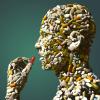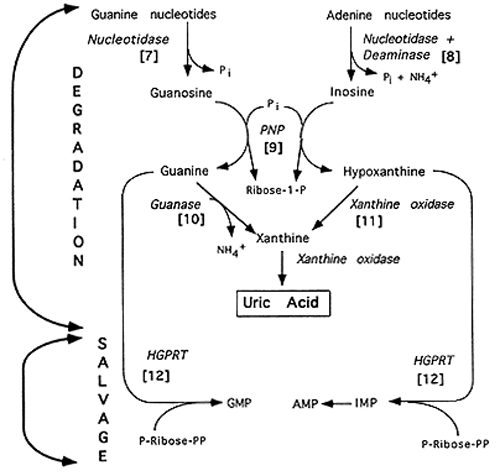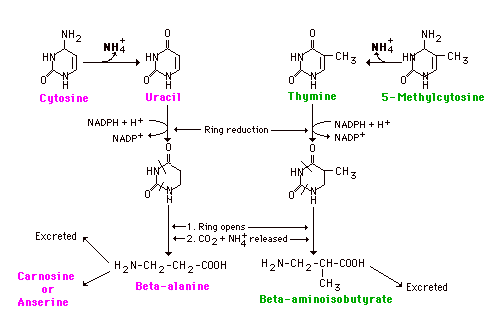CDP Choline increases ACh and dopamine rec...
 thedevinroy
14 Nov 2011
thedevinroy
14 Nov 2011
You actually need far more if I recall correctly... you can get ALA from Chai Seed as well, and it is without phytoestrogens. EPA and DHA can come from algae, if you need a plant source.Thanks Mr. Happy for the tip on DHA/EPA. I do not have much knowledge about EFA though they are a very important factor in diet.
Do you think it would be enough to supplement with flax oil instead to see the benefits you mentioned?
Yes. I use flaxseed oil myself. ALA breaks down to EPA & DHA. You just end up taking like 10 times as much flaxseed oil..
 thedevinroy
14 Nov 2011
thedevinroy
14 Nov 2011
Don't think anyone addressed this.why wouldn't you want more ACh receptors? If you had less, wouldn't that mean that you would need more choline supplementation to get the same effect?
A receptor receives a neurotransmitter and activates a signal. The nerve cell can receive more than one signal from more than one receptor. Thus, increasing receptor sites (densities) increases the hit-to-miss ratio... which means more signals overall, and more/better memory formation during the day.
 thedevinroy
14 Nov 2011
thedevinroy
14 Nov 2011
 health_nutty
14 Nov 2011
health_nutty
14 Nov 2011
Has anyone experienced long term benefits in the "focus" area from citicoline?
CDP Choline gives me wicked ACh headaches (I think this is with the combination of ALCAR).
 thedevinroy
14 Nov 2011
thedevinroy
14 Nov 2011
Have you tried taking with citric acid, malic acid, fumarate, vinegar, etc.?Has anyone experienced long term benefits in the "focus" area from citicoline?
CDP Choline gives me wicked ACh headaches (I think this is with the combination of ALCAR).
 health_nutty
14 Nov 2011
health_nutty
14 Nov 2011
Have you tried taking with citric acid, malic acid, fumarate, vinegar, etc.?Has anyone experienced long term benefits in the "focus" area from citicoline?
CDP Choline gives me wicked ACh headaches (I think this is with the combination of ALCAR).
I never have tried it with the other acid.
 thedevinroy
14 Nov 2011
thedevinroy
14 Nov 2011
They stimulate the citric acid cycle, and in theory clean up some acetic acid (acetyl or N-acetyl group) to use for energy.Have you tried taking with citric acid, malic acid, fumarate, vinegar, etc.?Has anyone experienced long term benefits in the "focus" area from citicoline?
CDP Choline gives me wicked ACh headaches (I think this is with the combination of ALCAR).
I never have tried it with the other acid.
 malden
14 Nov 2011
malden
14 Nov 2011
Has anyone experienced long term benefits in the "focus" area from citicoline?
My first post over here(the place where sience meet hehe creat forum!)
CDP choline is underway from te US, im gona use it for dopamine related side effects from te drug accutane en nortiptiline i have used in the past.
Results will i post over here.
 protoject
21 Nov 2011
protoject
21 Nov 2011
 nupi
21 Nov 2011
nupi
21 Nov 2011
My first post over here(the place where sience meet hehe creat forum!)
CDP choline is underway from te US, im gona use it for dopamine related side effects from te drug accutane en nortiptiline i have used in the past.
Results will i post over here.
Wait a second. What long term dopamine-related side effects does Accutane have? I know there has always been this discussion about suicides (which looking at the incidents sounded like incidental occurrences to me) but maybe that one screwed me up? I remember being depressed while on it at some points, but related that to having been caused by screwed up life circumstances - maybe I was wrong?
 tintinet
21 Nov 2011
tintinet
21 Nov 2011
I'd recommend for anyone who doesn't get any effect from CDP choline to try boosting their dose if they do not get side effects [my maximum would be 2g though you probably wouldn't need to do that all the time]. Personally I tried to go along with the "more doesn't mean better" approach but notice that every time I take a little bit more in the middle of the day it definitely effects me more positively.
What dose are you using? How much is 'a little bit more'?
 sam7777
21 Nov 2011
sam7777
21 Nov 2011
 malden
22 Nov 2011
malden
22 Nov 2011
My first post over here(the place where sience meet hehe creat forum!)
CDP choline is underway from te US, im gona use it for dopamine related side effects from te drug accutane en nortiptiline i have used in the past.
Results will i post over here.
Wait a second. What long term dopamine-related side effects does Accutane have? I know there has always been this discussion about suicides (which looking at the incidents sounded like incidental occurrences to me) but maybe that one screwed me up? I remember being depressed while on it at some points, but related that to having been caused by screwed up life circumstances - maybe I was wrong?
I think you are wrong..
There is much info over to find that it interacts wifh neurotransmittors,alsow dopamine.
Take alook at this site there is lot if knowlage over accutane en research
http://max001.proboa...play&thread=146
Same Here before accutane my life was verry nice, but now after accutane i have depression fear muscle pain ect. never had it before goin from alfamale to loser...
greeting, and goodluck
 thedevinroy
22 Nov 2011
thedevinroy
22 Nov 2011
Edited by devinthayer, 22 November 2011 - 08:01 PM.
 nupi
23 Nov 2011
nupi
23 Nov 2011
 JChief
23 Nov 2011
JChief
23 Nov 2011
<casually surreptitious whistle>
http://www.ncbi.nlm....ubmed/16055952/
So perhaps I could skip on the CDP choline since uridine seems to increase CDP levels in the brain already? After all there are studies that show Uridine+Omega 3s or even uridine alone show some promise so I am glad I waited before purchasing some CDP. Looking forward to trying it out for myself.
 thedevinroy
23 Nov 2011
thedevinroy
23 Nov 2011
<casually surreptitious whistle>
http://www.ncbi.nlm....ubmed/16055952/
Speaking of uridine... How do you prevent it (or its metabolites) from crystallizing in the kidneys with calcium, further how do you prevent it from turning into uric acid (gout runs in the family). My feet hurt bad enough from wearing the same flat soled shoes, and kidney stones were a bitch.
 thedevinroy
23 Nov 2011
thedevinroy
23 Nov 2011
Do you have studies on citicoline or uridine on AMPA or GABA-B receptor activity?<casually surreptitious whistle>
http://www.ncbi.nlm....ubmed/16055952/
I think Potassium release is mediated by those receptors.
 JChief
23 Nov 2011
JChief
23 Nov 2011
<casually surreptitious whistle>
http://www.ncbi.nlm....ubmed/16055952/
Speaking of uridine... How do you prevent it (or its metabolites) from crystallizing in the kidneys with calcium, further how do you prevent it from turning into uric acid (gout runs in the family). My feet hurt bad enough from wearing the same flat soled shoes, and kidney stones were a bitch.
*Promptly cancels order* wait gout. wha? stones in places they shouldn't be??
 thedevinroy
23 Nov 2011
thedevinroy
23 Nov 2011
<casually surreptitious whistle>
http://www.ncbi.nlm....ubmed/16055952/
Speaking of uridine... How do you prevent it (or its metabolites) from crystallizing in the kidneys with calcium, further how do you prevent it from turning into uric acid (gout runs in the family). My feet hurt bad enough from wearing the same flat soled shoes, and kidney stones were a bitch.
*Promptly cancels order* wait gout. wha? stones in places they shouldn't be??Devin please tell me you are overthinking this. Happy, chrono, someone put my mind at ease..
From Wiki: "High levels of purines [like uridine] are known to increase uric acid production and may aggravate or lead to conditions such as gout." Lower purine diets recommended for those sensitive to kidney stones: http://www.litholink...DietInformation
Anyhow, you might just be able to take citicoline as a form of uridine or even DHA/EPA to convert quicker to PC. Straight uridine is not something I'd like to try. I'd have to take it along something like Alpha-GPC or fish oil to ensure my body can use it and not try to turn it into uric acid or excrete it in another form. I was hoping MrHappy would have something to add on, possibly with a pubmed study of urine analysis, but I might be speaking too hopeful.
Edited by devinthayer, 23 November 2011 - 01:38 PM.
 JChief
23 Nov 2011
JChief
23 Nov 2011
<casually surreptitious whistle>
http://www.ncbi.nlm....ubmed/16055952/
Speaking of uridine... How do you prevent it (or its metabolites) from crystallizing in the kidneys with calcium, further how do you prevent it from turning into uric acid (gout runs in the family). My feet hurt bad enough from wearing the same flat soled shoes, and kidney stones were a bitch.
*Promptly cancels order* wait gout. wha? stones in places they shouldn't be??Devin please tell me you are overthinking this. Happy, chrono, someone put my mind at ease..
From Wiki: "High levels of purines [like uridine] are known to increase uric acid production and may aggravate or lead to conditions such as gout." Lower purine diets recommended for those sensitive to kidney stones: http://www.litholink...DietInformation
Anyhow, you might just be able to take citicoline as a form of uridine or even DHA/EPA to convert quicker to PC. Straight uridine is not something I'd like to try. I'd have to take it along something like Alpha-GPC or fish oil to ensure my body can use it and not try to turn it into uric acid or excrete it in another form. I was hoping MrHappy would have something to add on, possibly with a pubmed study of urine analysis, but I might be speaking too hopeful.
I am certainly going to take it with fish oil as I purchased that in combo. So maybe I'm good? We shall see!
 chrono
23 Nov 2011
chrono
23 Nov 2011
From Wiki: "High levels of purines [like uridine] are known to increase uric acid production and may aggravate or lead to conditions such as gout." Lower purine diets recommended for those sensitive to kidney stones: http://www.litholink...DietInformation
I don't think uridine is a purine. It doesn't have the fused ring structure, and all the articles I just read talk about purines and uridine as different classes. Uridine and cytidine are pyrimidine nucleosides. So I don't think it's going to be changed directly into uric acid, though my chemistry is pretty weak and I could be quite wrong about that.
Various purines are degraded to uric acid via several pathways; see these two graphics for examples [1] [2], and see these pages for some good discussions on purine biochemistry [3] [4]. Uridine does not appear to have a direct impact on purine degradation, that I could find with an hour's searching.
However, uridine is capable of stimulating ATP release [5], probably via P2 receptors [6], but ATP may also be consumed by the Uridine-UDP cycle [7]. ATP appears to be the primary link between the metabolism of puridines and pyrimidines [7]: it is required for the biosynthesis of several purine nucleotides [4], and itself contains the purine base adenine [3]. ATP depletion appears to increase purine degradation [8], and an increase of puridine degradation may increase uridine levels by inducing pyrimidine degradation (breakdown of UTP to uridine) [9].
So that brings us to this finding:
Is the plasma uridine level a marker of the overproduction of uric acid?
Yamamoto T, Moriwaki Y, Takahashi S, Tsutsumi Z, Yamakita J, Higashino K.
To determine whether the plasma level of uridine can be used to identify patients with gout, the plasma concentration of uridine was determined in patients with gout and normal subjects. Plasma uridine was significantly higher in patients with gout than in normal subjects. It was also significantly higher in patients with gout of the overexcretion (of uric acid) type than in those with gout of the underexcretion type. Plasma uridine was used to classify gout patients into underexcretion and overexcretion types, with a diagnostic accuracy of 92.5%. Results indicate that the plasma uridine concentration may be a marker of uric acid production and can be used to separate hyperuricemia into the overexcretion and underexcretion types.
This uridine/purine degradation correlation also exists in other models, like exercise [10] [11]. The last few references in the previous paragraph suggest that increased uridine may be a downstream effect of increased uric acid. However, these pyrimidine and purine pathways are linked in several different interconnected cycles of synthesis, degradation, and resalvage (i.e. a damn headache). Given the data I could find this morning, I'm unable to say whether this putative cause/effect relationship is strictly unidirectional (i.e. whether supraphysiological levels of uridine from supplementation might increase purine synthesis or degradation).
There are several genetic risk factors for gout, so if you suspect you carry any of these, it might be wise not to play with your uridine levels. Otherwise, I'm not sure. Personally, I'm a little uncomfortable tinkering with all the basic metabolic processes uridine seems involved with. If I end up taking this long-term or recommending it to family members, it will probably be in pretty low doses. Lots of other fish in the neurogenic and dopaminergic seas...
Edited by chrono, 23 November 2011 - 04:26 PM.
 X_Danny_X
23 Nov 2011
X_Danny_X
23 Nov 2011
 thedevinroy
23 Nov 2011
thedevinroy
23 Nov 2011
From Wiki: "High levels of purines [like uridine] are known to increase uric acid production and may aggravate or lead to conditions such as gout." Lower purine diets recommended for those sensitive to kidney stones: http://www.litholink...DietInformation
I don't think uridine is a purine. It doesn't have the fused ring structure, and all the articles I just read talk about purines and uridine as different classes. Uridine and cytidine are pyrimidine nucleosides. So I don't think it's going to be changed directly into uric acid, though my chemistry is pretty weak and I could be quite wrong about that.
Various purines are degraded to uric acid via several pathways; see these two graphics for examples [1] [2], and see these pages for some good discussions on purine biochemistry [3] [4]. Uridine does not appear to have a direct impact on purine degradation, that I could find with an hour's searching.
However, uridine is capable of stimulating ATP release [5], probably via P2 receptors [6], but ATP may also be consumed by the Uridine-UDP cycle [7]. ATP appears to be the primary link between the metabolism of puridines and pyrimidines [7]: it is required for the biosynthesis of several purine nucleotides [4], and itself contains the purine base adenine [3]. ATP depletion appears to increase purine degradation [8], and an increase of puridine degradation may increase uridine levels by inducing pyrimidine degradation (breakdown of UTP to uridine) [9].
So that brings us to this finding:Metabolism.' class='bbc_url' title='External link' rel='nofollow external'>http://www.ncbi.nlm.nih.gov/pubmed/9225835']Metabolism. 1997 Jul;46(7):801-4.→ source (external link)
Is the plasma uridine level a marker of the overproduction of uric acid?
Yamamoto T, Moriwaki Y, Takahashi S, Tsutsumi Z, Yamakita J, Higashino K.
To determine whether the plasma level of uridine can be used to identify patients with gout, the plasma concentration of uridine was determined in patients with gout and normal subjects. Plasma uridine was significantly higher in patients with gout than in normal subjects. It was also significantly higher in patients with gout of the overexcretion (of uric acid) type than in those with gout of the underexcretion type. Plasma uridine was used to classify gout patients into underexcretion and overexcretion types, with a diagnostic accuracy of 92.5%. Results indicate that the plasma uridine concentration may be a marker of uric acid production and can be used to separate hyperuricemia into the overexcretion and underexcretion types.
This uridine/purine degradation correlation also exists in other models, like exercise [10] [11]. The last few references in the previous paragraph suggest that increased uridine may be a downstream effect of increased uric acid. However, these pyrimidine and purine pathways are linked in several different interconnected cycles of synthesis, degradation, and resalvage (i.e. a damn headache). Given the data I could find this morning, I'm unable to say whether this putative cause/effect relationship is strictly unidirectional (i.e. whether supraphysiological levels of uridine from supplementation might increase purine synthesis or degradation).
There are several genetic risk factors for gout, so if you suspect you carry any of these, it might be wise not to play with your uridine levels. Otherwise, I'm not sure. Personally, I'm a little uncomfortable tinkering with all the basic metabolic processes uridine seems involved with. If I end up taking this long-term or recommending it to family members, it will probably be in pretty low doses. Lots of other fish in the neurogenic and dopaminergic seas...
Thank you for the research.

That's a nice graph. Does this mean that a fructose load can speed up ATP production from uridine?
 thedevinroy
23 Nov 2011
thedevinroy
23 Nov 2011

Here is an interesting drug: http://en.wikipedia....iki/Allopurinol . Works the same way as pycnogenol (pine bark extract, high PCO %) on gout: http://www.ncbi.nlm....pubmed/11087530 . Grape sead extract produces a similar effect: http://www.ncbi.nlm....pubmed/17295515 . The aforementioned drug and proanthocyanids (from grape sead or pine bark) both inhibit xanthine oxidase, preventing uric acid excretion. This alone might raise uridine levels.
Since I'll be taking regular pinebark extract, I could be in the clear for gout and kidney stones.
Edited by devinthayer, 23 November 2011 - 05:20 PM.
 protoject
23 Nov 2011
protoject
23 Nov 2011
I'd recommend for anyone who doesn't get any effect from CDP choline to try boosting their dose if they do not get side effects [my maximum would be 2g though you probably wouldn't need to do that all the time]. Personally I tried to go along with the "more doesn't mean better" approach but notice that every time I take a little bit more in the middle of the day it definitely effects me more positively.
What dose are you using? How much is 'a little bit more'?
my Max dose 2g, my usual is 1 g.
So usually I'll take a g in the morning, and might take up to another g some time half way into the day.
 thedevinroy
23 Nov 2011
thedevinroy
23 Nov 2011
That's pretty hardcore. Fights lethargy and low motivation I bet.I'd recommend for anyone who doesn't get any effect from CDP choline to try boosting their dose if they do not get side effects [my maximum would be 2g though you probably wouldn't need to do that all the time]. Personally I tried to go along with the "more doesn't mean better" approach but notice that every time I take a little bit more in the middle of the day it definitely effects me more positively.
What dose are you using? How much is 'a little bit more'?
my Max dose 2g, my usual is 1 g.
So usually I'll take a g in the morning, and might take up to another g some time half way into the day.
 MrHappy
23 Nov 2011
MrHappy
23 Nov 2011
<casually surreptitious whistle>
http://www.ncbi.nlm....ubmed/16055952/
Speaking of uridine... How do you prevent it (or its metabolites) from crystallizing in the kidneys with calcium, further how do you prevent it from turning into uric acid (gout runs in the family). My feet hurt bad enough from wearing the same flat soled shoes, and kidney stones were a bitch.
*Promptly cancels order* wait gout. wha? stones in places they shouldn't be??Devin please tell me you are overthinking this. Happy, chrono, someone put my mind at ease..
As very well covered by Chrono and Devin (thanks guys!), it's a pyrimidine, not a purine. Unless you are obtaining uridine from RNA, which will also include purines, it's a non-issue.
http://www.gout-awar...Catabolism.html
Pyrimidine Catabolism pt 1
In contrast to purines, pyrimidines undergo ring cleavage and the usual end products of catabolism are beta-amino acids plus ammonia and carbon dioxide. Pyrimidines from nucleic acids or the energy pool are acted upon by nucleotidases and pyrimidine nucleoside phosphorylase to yield the free bases. The 4-amino group of both cytosine and 5-methyl cytosine is released as ammonia.
Ring Cleavage
In order for the rings to be cleaved, they must first be reduced by NADPH. Atoms 2 and 3 of both rings are released as ammonia and carbon dioxide. The rest of the ring is left as a beta-amino acid. Beta-amino isobutyrate from thymine or 5-methyl cytosine is largely excreted. Beta-alanine from cytosine or uracil may either be excreted or incorporated into the brain and muscle dipeptides, carnosine (his-beta-ala) or anserine (methyl his-beta-ala).

Pyrimidine Catabolism pt 2
Purine and pyrimidine bases which are not degraded are recycled - i.e. reincorporated into nucleotides. This recycling, however, is not sufficient to meet total body requirements and so some de novo synthesis is essential. There are definite tissue differences in the ability to carry out de novo synthesis. De novo synthesis of purines is most active in liver. Non-hepatic tissues generally have limited or even no de novo synthesis. Pyrimidine synthesis occurs in a variety of tissues. For purines, especially, non-hepatic tissues rely heavily on preformed bases - those salvaged from their own intracellular turnover supplemented by bases synthesized in the liver and delivered to tissues via the blood.
"Salvage" of purines is reasonable in most cells because xanthine oxidase, the key enzyme in taking the purines all of the way to uric acid, is significantly active only in liver and intestine. The bases generated by turnover in non-hepatic tissues are not readily degraded to uric acid in those tissues and, therefore, are available for salvage. The liver probably does less salvage but is very active in de novo synthesis - not so much for itself but to help supply the peripheral tissues.
De novo synthesis of both purine and pyrimidine nucleotides occurs from readily available components.
Edited by MrHappy, 23 November 2011 - 11:19 PM.


